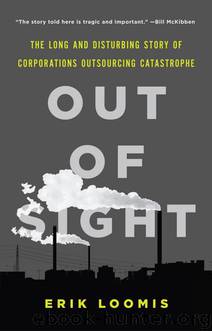Out of Sight: The Long and Disturbing Story of Corporations Outsourcing Catastrophe by Loomis Erik

Author:Loomis, Erik [Loomis, Erik]
Language: eng
Format: epub, azw3
ISBN: 9781620970775
Publisher: The New Press
Published: 2015-06-01T21:00:00+00:00
5
THE CLIMATE IS FOR SALE
In 2012, José Antonio Zamora Gutiérrez, Bolivia’s minister of environment and water, spoke at the United Nations Framework Convention on Climate Change in Doha, Qatar. Gutiérrez forcefully stated, “The climate is not for sale.” He rejected market-based solutions for carbon emissions and noted how the international market was destroying the planet’s fragile life.1 Under the presidency of Evo Morales, Bolivia has become an international leader in fighting for climate justice, asking why a poor country in an arid environment with a shaky water supply should have to suffer for the wanton energy use of the world’s rich nations.
Unfortunately, the climate is absolutely for sale, and in this marketplace, rich nations have hidden the costs from consumers through concealing energy production. Petroleum corporations extract dirty energy from all around the world, sending it to American consumers. The energy industry is predicated upon consumers not having to think about where their power comes from. When we fill up our car, we fret over fuel prices, but what is the impact of oil production on the countries that produce it? We have a vague sense that it comes from the Middle East, but little more. But this search for energy has driven the geopolitical agenda for decades, radically transformed societies, ravaged ecosystems, and subjected the people living in its production and processing zones to cancer and pollution. As energy consumers we are almost completely isolated from the effects of this system, unless supplies become limited.
The connection between fossil fuels and climate change makes this issue all the more urgent. Increased carbon emissions are drastically raising the planet’s temperatures, melting the polar ice caps, raising sea levels, destroying coastal ecosystems, and inundating coastal communities. Drought will expand deserts and imperil our food supply while fires destroy forests. Like all environmental crises, climate change will disproportionately affect the world’s poor, who have contributed little to the problem. Economic injustice and environmental injustice combine to create catastrophic climate change. ExxonMobil’s drill sites in Kuwait, processing plants in Texas, and gas stations in New York outsource the effects of this system to Inuits in Alaska, Bangladeshis living on the Ganges River delta, and the residents of low-lying island nations like Kiribati and Tuvalu, all of whom are among the first people directly affected by the changing climate.
When oil is produced in Nigeria, Saudi Arabia, or Venezuela, its horrible effects are out of sight for Americans. But petroleum companies can outsource only so much production because they have to follow the fossil fuel deposits. When oil is produced in the United States or other Western nations, the filthy industry can create flash points of resistance. Experiencing the impact of energy production opens the eyes of those who witness it. Once again, knowledge has the potential to transform politics. If those resisting fracking and the Keystone XL pipeline can build upon those efforts to connect domestic and foreign energy production, they can do much to build national and international pressure for a clean energy infrastructure
Download
Out of Sight: The Long and Disturbing Story of Corporations Outsourcing Catastrophe by Loomis Erik.epub
Out of Sight: The Long and Disturbing Story of Corporations Outsourcing Catastrophe by Loomis Erik.azw3
This site does not store any files on its server. We only index and link to content provided by other sites. Please contact the content providers to delete copyright contents if any and email us, we'll remove relevant links or contents immediately.
Life 3.0: Being Human in the Age of Artificial Intelligence by Tegmark Max(5549)
The Sports Rules Book by Human Kinetics(4379)
The Age of Surveillance Capitalism by Shoshana Zuboff(4279)
ACT Math For Dummies by Zegarelli Mark(4043)
Unlabel: Selling You Without Selling Out by Marc Ecko(3659)
Blood, Sweat, and Pixels by Jason Schreier(3616)
Hidden Persuasion: 33 psychological influence techniques in advertising by Marc Andrews & Matthijs van Leeuwen & Rick van Baaren(3559)
The Pixar Touch by David A. Price(3431)
Bad Pharma by Ben Goldacre(3422)
Urban Outlaw by Magnus Walker(3392)
Project Animal Farm: An Accidental Journey into the Secret World of Farming and the Truth About Our Food by Sonia Faruqi(3216)
Kitchen confidential by Anthony Bourdain(3080)
Brotopia by Emily Chang(3050)
Slugfest by Reed Tucker(2997)
The Content Trap by Bharat Anand(2917)
The Airbnb Story by Leigh Gallagher(2851)
Coffee for One by KJ Fallon(2630)
Smuggler's Cove: Exotic Cocktails, Rum, and the Cult of Tiki by Martin Cate & Rebecca Cate(2531)
Beer is proof God loves us by Charles W. Bamforth(2453)
